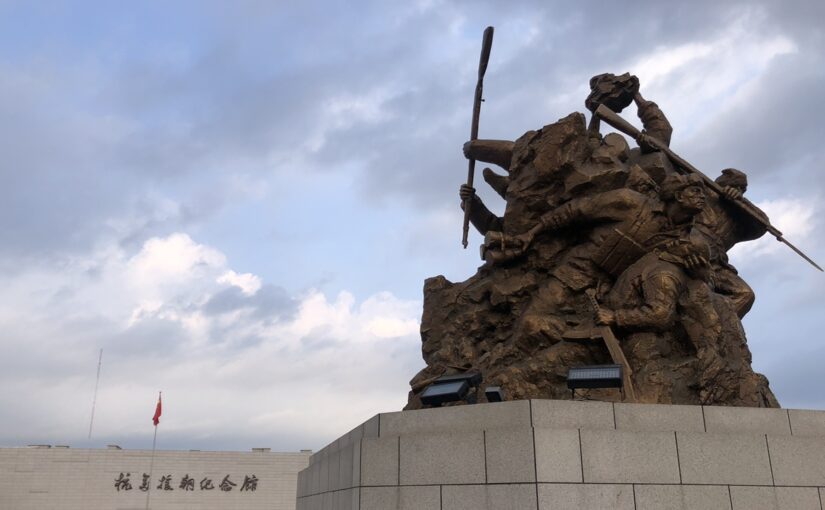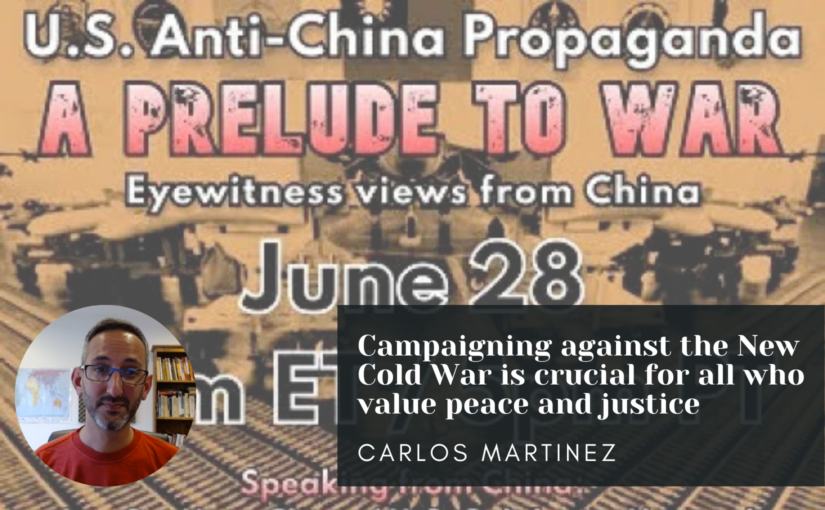Written to coincide with the 70th anniversary of the Korean Armistice Agreement, this book review by Carlos Martinez of IF Stone’s recently re-issued The Hidden History of the Korean War seeks to identify the lessons to be learnt from the so-called “forgotten war”, and to draw out parallels between the original Cold War in the Pacific and the New Cold War in the Pacific.
A shorter version of this review was published in the Morning Star.
The 27th of July 2023 marks 70 years since the signing of the armistice agreement at Panmunjom, finally bringing about a cessation of hostilities in a war that was extraordinarily destructive but which has been largely ignored.
As Bruce Cumings writes in his preface to I.F. Stone’s classic The Hidden History of the Korean War – first published in 1952 and recently reissued by Monthly Review Press – the Korean War is a forgotten war, “remembered mainly as an odd conflict sandwiched between the good war (World War 2) and the bad war (Vietnam).”
For those seeking to build a peaceful and prosperous future for humanity, the lessons of the Korean War must not be forgotten. Indeed re-reading The Hidden History it becomes clear that there are several crucial parallels with today’s world.
Stone’s meticulous investigation provides abundant proof that most of the key players in the US government and military actively wanted the Korean War; that it was the right war, in the right place and the right time in terms of US imperialist interests.
Top US generals have since admitted that their “police action” in Korea gave them just the excuse they needed to construct the military infrastructure of Cold War in the Pacific: a vast network of overseas bases; large-scale, long-term deployments of US troops in Korea and Japan; and the permanent stationing of nuclear warheads in the region.
The Korean War set the whole military-industrial complex in motion. It created the national security state. It was the first major test case for the Truman Doctrine of “support for democracies against authoritarian threats” and helped establish the US in its self-assumed role of global policeman. By forcing through a United Nations endorsement of its invasion, the US was able to establish its dominance of the UN-based international system.
Reading Izzy Stone’s reporting today, it’s striking the extent to which these mechanisms of Cold War still exist and are being used to wage a New Cold War. The military bases, the troop deployments, the nuclear threats that aimed to contain socialism and prevent the emergence of a multipolar world in the 1950s continue to serve the same purposes in 2023.
Stone’s book emphasises that peace was very much an option in 1950.
The Soviet Union of course wanted peace; having lost 27 million lives and sustained incredible damage to its infrastructure in the course of saving the world from Nazism, the Soviets needed space to rebuild. The People’s Republic of China also wanted peace; having only been founded in October 1949 after long years of civil war and struggle against Japanese occupation, the last thing the new state needed was to become embroiled in another war. (In the event, nearly 400,000 Chinese volunteers gave their lives fighting in Korea).
The US could have accepted the post-WW2 reality: that some countries had chosen the path of socialism, and that many other countries were throwing off the shackles of colonialism and seeking to explore an independent path to development.
The US could furthermore have accepted an emerging status quo in East Asia. Before the US invasion, the trajectory was for Korea to be united under a popular, communist-led government; for Taiwan to become part of the People’s Republic of China; for China to regain its rightful seat at the UN; and for US troops to be removed from Japan.
Such a configuration would have reflected the will of the peoples of the region, but it wasn’t consistent with Washington’s idiosyncratic vision of a “rules-based world order”. The major western powers, led by the US, rejected peace and chose containment, encirclement, blockade and war.
They chose a strategy of doing everything they could to weaken the socialist countries and the forces of national liberation and sovereign development. They chose the Cold War – which for the people of Korea, Vietnam, Angola, Nicaragua, Chile, and many other countries of the Global South was not cold at all.
Seventy years later, the “End of History” fever dream is over and the West is once again faced with a rising socialism and an irrepressible multipolar trend, at the centre of which is China. Once again there is a choice between peace and conflict.
China has become a major player in global affairs. It’s the largest trading partner of two-thirds of the world’s countries. It’s the second largest economy in the world in dollar terms. It’s taken the lead globally on poverty alleviation and on sustainable development. It’s on the cutting edge of advanced industry, of telecommunications, of artificial intelligence, of renewable energy and more.
Through mechanisms such as BRICS and the Shanghai Cooperation Organisation, China is promoting solidarity and shared development of the Global South. China is playing a positive role in promoting sovereign development in Africa, Latin America, the Middle East, Central Asia, the Caribbean, and Pacific – regions that have been held in underdevelopment for centuries by the colonial and imperial powers.
What’s more, China is recognised globally for its consistent pursuit of peace. Where the West has stoked conflict in Ukraine, China has worked with all parties for a peaceful settlement. Where the US has stoked division in the Middle East, China has facilitated a rapprochement between Iran and Saudi Arabia, thereby potentially clearing a path for an end to the horrific war in Yemen.
Can the West adapt to this new reality? Can it accept China’s rise? Can it accept that the countries of the world want to determine their own economic policy and their own foreign policy? Can it accept that the era of colonialism and imperialism is over? Can it accept that the idea of any one country being the “world’s policeman” really has no place in the modern world?
Can the West work with China, with Iran, with Russia and other countries to solve the major existential problems that humanity faces? Or will the US and its allies continue on the ruinous path of a New Cold War – and potentially a devastating hot war? Such are the defining geopolitical questions of our era.
The Hidden History of the Korean War is essential reading for those who are educating and organising towards peace; towards building a mass anti-war movement that our governments can’t ignore.


